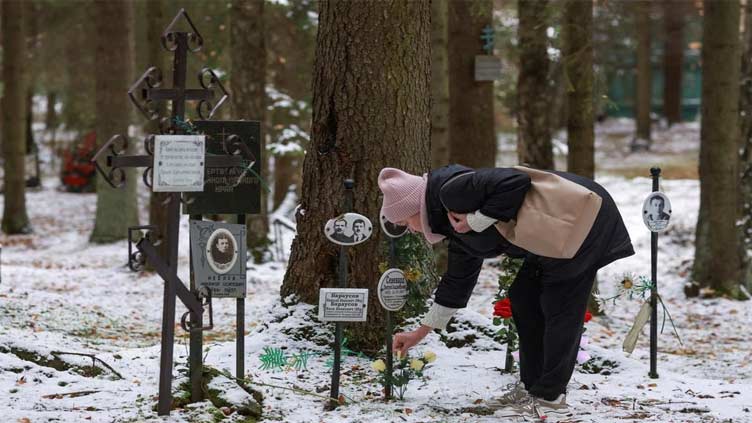Russians struggle to keep alive memory of Stalin's victims

World
Vladimir Putin has instead praised Stalin for saving the Soviet Union from Nazi invaders
ST PETERSBURG (Reuters) - Russians came in dribs and drabs to lay flowers to the victims of Soviet dictator Joseph Stalin's purges, on an official day of remembrance largely shunned by an establishment keen to blank out reminders of Russia's troubled past.
Natalia Anafonova came to St Petersburg's Levashov Cemetery to honour her great-grandfather.
"It was a tragedy for our family," she says. "Our (great-) grandmother, when her husband was shot, was left alone with four children. She was expelled to Uglich (about 740km from St Petersburg).
"He was shot in Moscow, but as we all live in St. Petersburg, we have made this memorial plaque here. So that we could come here, to honour his memory and remember him forever."
It is not an attitude shared by the Russian president, who has sought to suppress attempts to evaluate Stalin critically.
/cloudfront-us-east-2.images.arcpublishing.com/reuters/LVCHEXVFSFOFXMYRYLIFSDP634.jpg)
Vladimir Putin has instead praised Stalin for saving the Soviet Union from Nazi invaders, and tried to channel that heroic spirit as his own forces seize parts of Ukraine in a war that he casts as a struggle against alleged Western attempts to destroy Russia.
Yet for many Russians, Stalin's name still evokes the savage repression that culminated in the Great Terror of 1936-1938.
Zinaida Gerchikova said the day was sacred to her because she knew nothing about her father. "In fact, I only saw him once, when he picked me up from the maternity hospital," she said.
"They don't know where he was shot. Somewhere in Sverdlovsk region. I've been given some tips at the Big House," Gerchikova said. The Big House is the nickname of the St Petersburg headquarters of Stalin's NKVD secret police, which later became that of the Soviet KGB and now the Russian FSB.
/cloudfront-us-east-2.images.arcpublishing.com/reuters/B23KGFJPI5JKLD6SVVQMB2JLZY.jpg)
"I've made inquiries, but to no avail. But I need to remember my father."
It was to help people like Gerchikova that the Nobel Peace Prize-winning human rights group Memorial International was founded as the Soviet Union collapsed - to document Soviet political repression and help to rehabilitate its victims.
But the group was banned in Russia in 2021 and officially dissolved under a decades-long campaign to silence political dissent.
/cloudfront-us-east-2.images.arcpublishing.com/reuters/A6AZEYKNOZIVZGZPBQ2MXCOQFA.jpg)
"I think some very bad things are happening in our society," said Sergei Gorshvo, contemplating Stalin's purges as he paid his respects at the cemetery.
"They're making clear to us that all that may come back. And that's the scariest thing."


